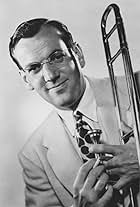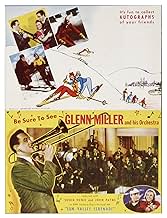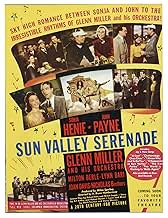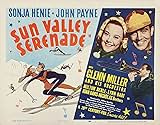Glenn Miller(1904-1944)
- Music Department
- Actor
- Composer
Alton Glenn Miller was born on March 1, 1904, in Clarinda, Iowa; the
son of Lewis Elmer and Mattie Lou Cavender Miller. He started his music
studies when his father gave him a mandolin. He soon traded the
mandolin for an old horn. In 1916 he switched to trombone. In 1923, he
enrolled in the University of Colorado, but after a year, he dropped
out of school and moved to Los Angeles, where he joined Ben Pollack's
band. He spent most of his time playing gigs and attending auditions.
In 1928, Miller moved to New York, where he played session gigs and made orchestrations. At that time he studied with the Russian musician and mathematician Joseph Schillinger, whose star apprentice was George Gershwin. Miller took Schillinger's instruction on orchestration of a practice exercise, which he developed into the song "Moonlight Serenade", making a small fortune with it. In 1934, Miller joined the Dorsey Brothers' Orchestra for a year, then organized an American band for Ray Noble, and made his debut at the Rainbow Room in New York's Rockefeller Center. The special sound of his band was developed in Miller's orchestration by using the "crystal chorus" and other inventive ways of arrangement.
Miller recorded his own band first time for Columbia Records on April 25, 1935. His instrumental "Solo Hop" reached the Top Ten in 1935, but he did not organize an orchestra under his own name until March of 1937. That band ultimately failed, and in 1938 he reorganized with many different musicians. In 1939, Miller and his new band got an engagement at the Glen Island Casino in New Rochelle, NY, which was a major spot with a radio wire. In 1939, he scored seventeen Top Ten hits, including such songs, as "Sunrise Serenade", "Moonlight Serenade", "Stairway to the Stars", "Moon Love", "Over the Rainbow", "Blue Orchids", "The Man With the Mandolin", and other popular songs, which he composed or orchestrated. Miller scored 31 Top Ten hits in the year 1940, and another 11 Top Ten hits in 1941.
His number one hits included "Song of the Volga Boatmen", "You and I", "Chattanooga Choo Choo", from his first film, 'Sun Valley Serenade'. Miller worked with the vocalists Tex Beneke, Ray Eberle, and the Modernaires with Paula Kelly. On February 10, 1942, Miller was presented with the first ever "Gold record" for "Chattanooga Choo Choo" and scored another 11 Top Ten hits in 1942. That was the first full year of his country's participation in the Second World War.
Although he was well beyond draft age Miller still strongly wanted to use his talents to help the war effort. After being turned down for a Navy commission he applied to the Army and was accepted with the rank of Captain. On September 27, 1942 he gave his last performance as a civilian. The Army assigned him to the Army Air Forces at Yale University in New Haven, Connecticut. He first organized a marching band, then built a large dance band with over two dozen jazz players and 21 string musicians. From January 1943 to June 1944 the Glenn Miller AAF Band made hundreds of live performances, "I Sustain the Wings" radio broadcasts, while previously-unreleased recordings by the former civilian band scored another 10 Top Ten hits in the year 1943. Miller took his band to Britain in June 1944. There he performed for the allied troops and did radio shows. His last recording of 20 new songs was made weeks before his death; it was released only in 1995.
After the liberation of France, now-Major Glenn Miller wanted to bring his music closer to the troops serving on the Continent and arranged to have the band transferred to Paris. He planned to travel ahead of time to prepare for the full orchestra's arrival but bad weather delayed his flight. On December 15, 1944 he accepted an invitation from another officer who was going to Paris on what turned out to be an unauthorized flight. He apparently was unaware that the plane's pilot was inexperienced in winter flying, and more tragically, that the small UC-64 "Norseman" transport had been suffering from fuel-system problems.
The plane never arrived in Paris, and on December 24, 1944 the AAF officially reported it and its crew as MIA (Missing in Action), under the presumption that it had gone down in the English Channel. In 1985, the British Ministry of Defence came up with explanation of Miller's disappearance, claiming that his plane was struck by a British bomb dropped in the waters by returning RAF pilots. Subsequent research has given credence to the alternate hypothesis that the plane crashed due to icing of its fuel system in the cold air over the Channel. However no wreckage, remains, or IDs have ever been found, precluding any definitive explanation. Glenn Miller was eventually officially declared dead; at his daughter's request a memorial tombstone was placed in Memorial Section H, Number 464-A on Wilson Drive in Arlington National Cemetery in April of 1992,
In 1928, Miller moved to New York, where he played session gigs and made orchestrations. At that time he studied with the Russian musician and mathematician Joseph Schillinger, whose star apprentice was George Gershwin. Miller took Schillinger's instruction on orchestration of a practice exercise, which he developed into the song "Moonlight Serenade", making a small fortune with it. In 1934, Miller joined the Dorsey Brothers' Orchestra for a year, then organized an American band for Ray Noble, and made his debut at the Rainbow Room in New York's Rockefeller Center. The special sound of his band was developed in Miller's orchestration by using the "crystal chorus" and other inventive ways of arrangement.
Miller recorded his own band first time for Columbia Records on April 25, 1935. His instrumental "Solo Hop" reached the Top Ten in 1935, but he did not organize an orchestra under his own name until March of 1937. That band ultimately failed, and in 1938 he reorganized with many different musicians. In 1939, Miller and his new band got an engagement at the Glen Island Casino in New Rochelle, NY, which was a major spot with a radio wire. In 1939, he scored seventeen Top Ten hits, including such songs, as "Sunrise Serenade", "Moonlight Serenade", "Stairway to the Stars", "Moon Love", "Over the Rainbow", "Blue Orchids", "The Man With the Mandolin", and other popular songs, which he composed or orchestrated. Miller scored 31 Top Ten hits in the year 1940, and another 11 Top Ten hits in 1941.
His number one hits included "Song of the Volga Boatmen", "You and I", "Chattanooga Choo Choo", from his first film, 'Sun Valley Serenade'. Miller worked with the vocalists Tex Beneke, Ray Eberle, and the Modernaires with Paula Kelly. On February 10, 1942, Miller was presented with the first ever "Gold record" for "Chattanooga Choo Choo" and scored another 11 Top Ten hits in 1942. That was the first full year of his country's participation in the Second World War.
Although he was well beyond draft age Miller still strongly wanted to use his talents to help the war effort. After being turned down for a Navy commission he applied to the Army and was accepted with the rank of Captain. On September 27, 1942 he gave his last performance as a civilian. The Army assigned him to the Army Air Forces at Yale University in New Haven, Connecticut. He first organized a marching band, then built a large dance band with over two dozen jazz players and 21 string musicians. From January 1943 to June 1944 the Glenn Miller AAF Band made hundreds of live performances, "I Sustain the Wings" radio broadcasts, while previously-unreleased recordings by the former civilian band scored another 10 Top Ten hits in the year 1943. Miller took his band to Britain in June 1944. There he performed for the allied troops and did radio shows. His last recording of 20 new songs was made weeks before his death; it was released only in 1995.
After the liberation of France, now-Major Glenn Miller wanted to bring his music closer to the troops serving on the Continent and arranged to have the band transferred to Paris. He planned to travel ahead of time to prepare for the full orchestra's arrival but bad weather delayed his flight. On December 15, 1944 he accepted an invitation from another officer who was going to Paris on what turned out to be an unauthorized flight. He apparently was unaware that the plane's pilot was inexperienced in winter flying, and more tragically, that the small UC-64 "Norseman" transport had been suffering from fuel-system problems.
The plane never arrived in Paris, and on December 24, 1944 the AAF officially reported it and its crew as MIA (Missing in Action), under the presumption that it had gone down in the English Channel. In 1985, the British Ministry of Defence came up with explanation of Miller's disappearance, claiming that his plane was struck by a British bomb dropped in the waters by returning RAF pilots. Subsequent research has given credence to the alternate hypothesis that the plane crashed due to icing of its fuel system in the cold air over the Channel. However no wreckage, remains, or IDs have ever been found, precluding any definitive explanation. Glenn Miller was eventually officially declared dead; at his daughter's request a memorial tombstone was placed in Memorial Section H, Number 464-A on Wilson Drive in Arlington National Cemetery in April of 1992,





















